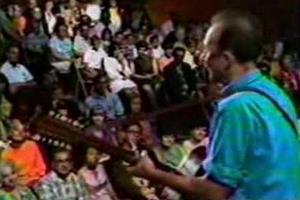Pete Seeger, who died Monday at age 94, ended a 17-year prime-time TV blacklist of his talents by performing triumphantly in 1967 on The Smothers Brothers Comedy Hour…
It was one of the best, most significant, most moving musical performances ever seen on that 1967-69 CBS variety series. Seeger, a seminal figure in the folk movement as a member of The Weavers in the 1950s, had been victimized as a target of McCarthyism, accused in the Communist witch-hunting publication Red Channels as one of hundreds of show-business figures with alleged Communist sympathies.
Seeger was denied work on television, except for a pair of unsponsored Sunday morning programs, for the next 17 years. Then, near the end of the first, unexpectedly successful season of The Smothers Brothers Comedy Hour, producers were approached by CBS Chairman William S. Paley with a personal request: please quit making fun of then-President Lyndon B. Johnson, who had a habit of phoning CBS executives directly to complain. Paley asked what the brothers might like, that Paley might offer, in exchange for complying with his request. Paley was told that Tom and Dick Smothers had asked for Pete Seeger to be booked as a guest star on the show, but were told he couldn’t be hired. Paley said he could, and that was that – at least at first.
 For the opening show of the second season in 1967, Seeger reported for duty with a collection of songs, including his own “Where Have All the Flowers Gone?,” a trio of sing-along numbers, and his newest composition: “Waist Deep in the Big Muddy,” an anti-Vietnam War allegory.
For the opening show of the second season in 1967, Seeger reported for duty with a collection of songs, including his own “Where Have All the Flowers Gone?,” a trio of sing-along numbers, and his newest composition: “Waist Deep in the Big Muddy,” an anti-Vietnam War allegory.
This was at the height of Johnson’s escalation of the Vietnam War, and when Seeger performed the song at the afternoon rehearsal for the show, CBS censors balked immediately. Seeger performed the song as part of his set during the evening taping as well – but when the Season 2 premiere was televised the following week, on Sept. 10, 1967, “Waist Deep” had been cut from the show. Tom Smothers immediately went to the press, giving interviews about how CBS had mistreated a musical institution and violated the spirit of the creative control the Smothers Brothers had been promised by CBS.
As months went by, Tom kept giving interviews, as did Seeger, protesting the excision of Seeger’s segment. Meanwhile, current events were quickly changing national attitudes about Vietnam significantly. In February 1968, CBS gave the Smothers Brothers permission to invite Seeger back on the series – and, specifically, to sing the song the network had considered inappropriate five months earlier. Seeger agreed, and in his second appearance that season on The Smothers Brothers Comedy Hour, performed a medley of anti-war songs dating from different wars in American history, followed by a proudly defiant, emotionally gripping version of “Waist Deep in the Big Muddy.”
His Feb. 25, 1968 performance is one of my favorite moments from The Smothers Brothers Comedy Hour.
The appearance’s final, ironic punch line was that “Waist Deep in the Big Muddy,” while never mentioning Johnson by name, was an obvious attack on LBJ and his war policy. When Seeger sings “Waist deep in the Big Muddy / And the big fool says to push on,” there is little doubt about whom, or what, Seeger is referring.
What a song. What a moment. What a man.
When I started work on my 2009 book about the Smothers Brothers – Dangerously Funny: The Uncensored Story of ‘The Smothers Brothers Comedy Hour’ – the first person I interviewed, in 1992, was Pete Seeger. It was a practical as well as biographical decision, because Seeger was 73 years old then, and I was worried that he might not live that much longer.
I shouldn’t have worried. Pete Seeger lived another 21 years.
“Singing on The Smothers Brothers was one of the high points in my long life,” Seeger told me back in 1992. “I look back on it with pleasure…
“Maybe the song did some good,” he added with understandable pride, and a little impishness. “President Johnson decided not to run again a month after I finally got it on the air.”